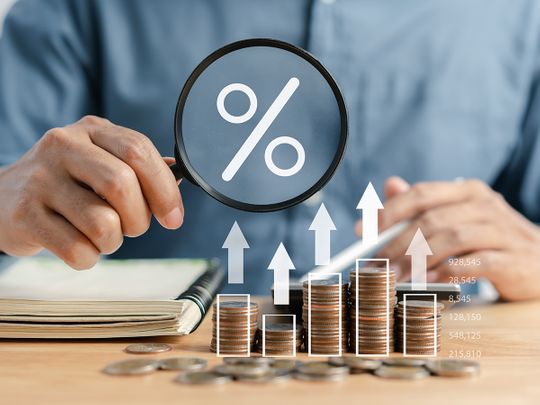
Dubai: Up until now, rising interest rates across the world made borrowing for consumers steadily more expensive, which in turn naturally discourages higher spending. But with this trend to reverse in 2024, will you see your purchasing power grow? In theory yes, but let’s delve further.
After the world’s largest economy US on Wednesday signalled that it would pencil in at least three interest rate cuts in 2024 after thrice pausing its streak of 10 rate hikes, with central banks elsewhere also expectedly following suit worldwide, economists and veteran investors have widely been evaluating how this would affect people and their finances.
In almost every economy, interest rate hikes over the last year have resulted in a spike in mortgage rates, elevated the costs of auto loans, credit card borrowing and business loans. But if interest rates drop next year across the world, here’s how this can translate to matters concerning your money.
How higher interest rates affected purchasing power
“Rising interest rates have clearly affected spending on a global level because the cost of borrowing money went up,” explained Mohammad Shaan, a Dubai-based wealth manager. “So, if you have any type of credit card or loan, you ended up paying more for the money you borrowed.
“However, what’s often overlooked is the fact that this will also mean that you inevitably have less money to spend elsewhere. So, while higher interest rates make it more expensive for people to borrow money and encourage people to save, that means people will tend to spend less.”
If people spend less on goods and services overall, the prices of those things tend to rise more slowly, and this is meant to keep inflation in check. But is this what was happening currently? “Interest rate hikes and restricted spending both helped contribute to rein in inflation across most economies – but only to an extent,” added Shaan.
Rising interest rates have clearly affected spending on a global level because the cost of borrowing money went up
How soaring inflation resulted in multiple rate hikes
For economies worldwide, there has been a prevalent threat of inflation re-accelerating and requiring even more of such drastic rate hikes in the future, if central banks don’t keep reining in a surge in prices by making it more expensive for businesses and people to borrow money.
“The good news now is global inflation has meaningfully slowed since the last rate hike in July and consumers are beginning to spend less – suggesting that the world economy is playing out the way central banks had hoped,” added Shaan.
“Up until now, the higher rate of interest meant borrowers paying even more interest on credit cards, loans, and other types of variable-rate debt. With interest rate hikes peaking now, it will start to get cheaper for borrowers next year, as indicated by the rate hake decision yesterday.”
Borrowing rates won’t drop just yet, wait till 2024-end to benefit
Higher interest rates mean it’s more expensive to borrow money, which slows or delays big purchases, lower rates encourage borrowing and tend to increase money supply in the market. For example, the lower the interest rate the lower the monthly mortgage payments on a newly purchased house.
“As interest rates peak now and definitely drop next year, if you’ve been considering a large financial decision now, such as buying a house or purchasing a car, consider postponing plans until you get favourable loan terms towards the end of 2024,” Shaan added.
“Also, credit cards with variable rates tend to drop when the rates start to slow. So, if you’re trying to catch up on credit card debt, this can be of some help. If you already have a loan, lower interest rates might mean it is a good time to evaluate your current terms and consider refinancing it.”
Your investments stand to benefit when interest rates start to go down, but not when they are paused or continue at existing levels
How to benefit from paused interest rate hikes or a rate hike drop?
“Your investments stand to benefit when interest rates start to go down, but not when they are paused or continue at existing levels,” said Brody Dunn, an investment manager at a UAE-based asset advisory. “But your bond investments give good returns in a high-rate environment.
“When it comes your investments in stocks, high interest rates tend to make stocks more attractive to investors, as they can generate higher returns than fixed-income investments. This can lead to a rise in stock prices, which can result in higher returns for those who have invested in stocks.”
Dunn reiterated that lower rates also incentivise borrowing, so as businesses make more investments in their business, their stock prices tend to rise again. “So, depending on your asset allocation, lower or higher interest rates could affect you positively or negatively,” he added.
Bottom line?
While increasing rates makes borrowing more costly and can rein in spending in favour of saving, lower interest rates make borrowing cheaper - allowing people to spend and invest more freely. As rate hikes have now halted, and start dropping in the coming months, borrowing, and spending will rise.
“While borrowing may provide better terms when interest rates are low, it’s still wise to be cautious. In contrast, some areas that could offer lower rates of return when interest rates go down include savings accounts, deposits, bonds, and money market accounts,” added Dunn.
“While your savings account will be earning less interest when interest rates are low, it’s still important to keep saving. Especially if you haven’t built up an emergency fund, you’ll want to save in the case of an unexpected major event.”
However, realistically, financial planners often reiterate that for most people, if you have an established savings plan and financial goals, a lower interest rate will most likely not be a significant reason to materially change your saving strategy.

_resources1_16a4a1613d8_small.jpg)







